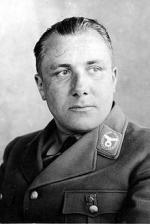Disable ads!
Martin Bormann
Martin Bormann (17 June 1900 – 2 May 1945) was a prominent official in Nazi Germany as head of the Parteikanzlei (Nazi Party Chancellery). He gained immense power within the Third Reich by using his position as Adolf Hitler's private secretary to control the flow of information and access to Hitler. Bormann joined a paramilitary Freikorps organisation in 1922 while working as manager of a large estate. He served nearly a year in prison as an accomplice to his friend Rudolf Höss (later commandant of Auschwitz concentration camp) in the murder of Walther Kadow. Bormann joined the Nazi Party in 1927 and the Schutzstaffel (SS) in 1937. He initially worked in the party's insurance service, and transferred in July 1933 to the office of Deputy Führer Rudolf Hess, where he served as chief of staff. Bormann used his position to create an extensive bureaucracy and involve himself as much as possible in the decision making. He gained acceptance into Hitler's inner circle, and accompanied him everywhere, providing briefings and summaries of events and requests. He began acting as Hitler's personal secretary in 1935, a post to which he was officially appointed in 1943. After Hess's solo flight to Britain on 10 May 1941 to seek peace negotiations with the British government, Bormann assumed Hess's former duties, with the title of Head of the Parteikanzlei (Party Chancellery). He had final approval over civil service appointments, reviewed and approved legislation, and by 1943 had de facto control over all domestic matters. Bormann was one of the leading proponents of the ongoing persecution of the Christian churches and favoured harsh treatment of Jews and Slavs in the areas conquered by Germany during World War II. Bormann returned with Hitler to the Führerbunker in Berlin on 16 January 1945 as the Red Army approached the city. After Hitler committed suicide, Bormann and others attempted to flee Berlin on 2 May to avoid capture by the Russians. Bormann probably committed suicide on a bridge near Lehrter station. The body was buried nearby on 8 May 1945, but was not found and confirmed as genuine until 1972. Bormann was tried in absentia by the International Military Tribunal in the Nuremberg trials of 1945 and 1946. He was convicted of war crimes and crimes against humanity and sentenced to death by hanging.
 Read more on wikipedia.org Read more on wikipedia.org
 All quotes by Martin Bormann All quotes by Martin Bormann
 Edit Edit
|

|
|
|
|
|
Background photo by Giuliana
|